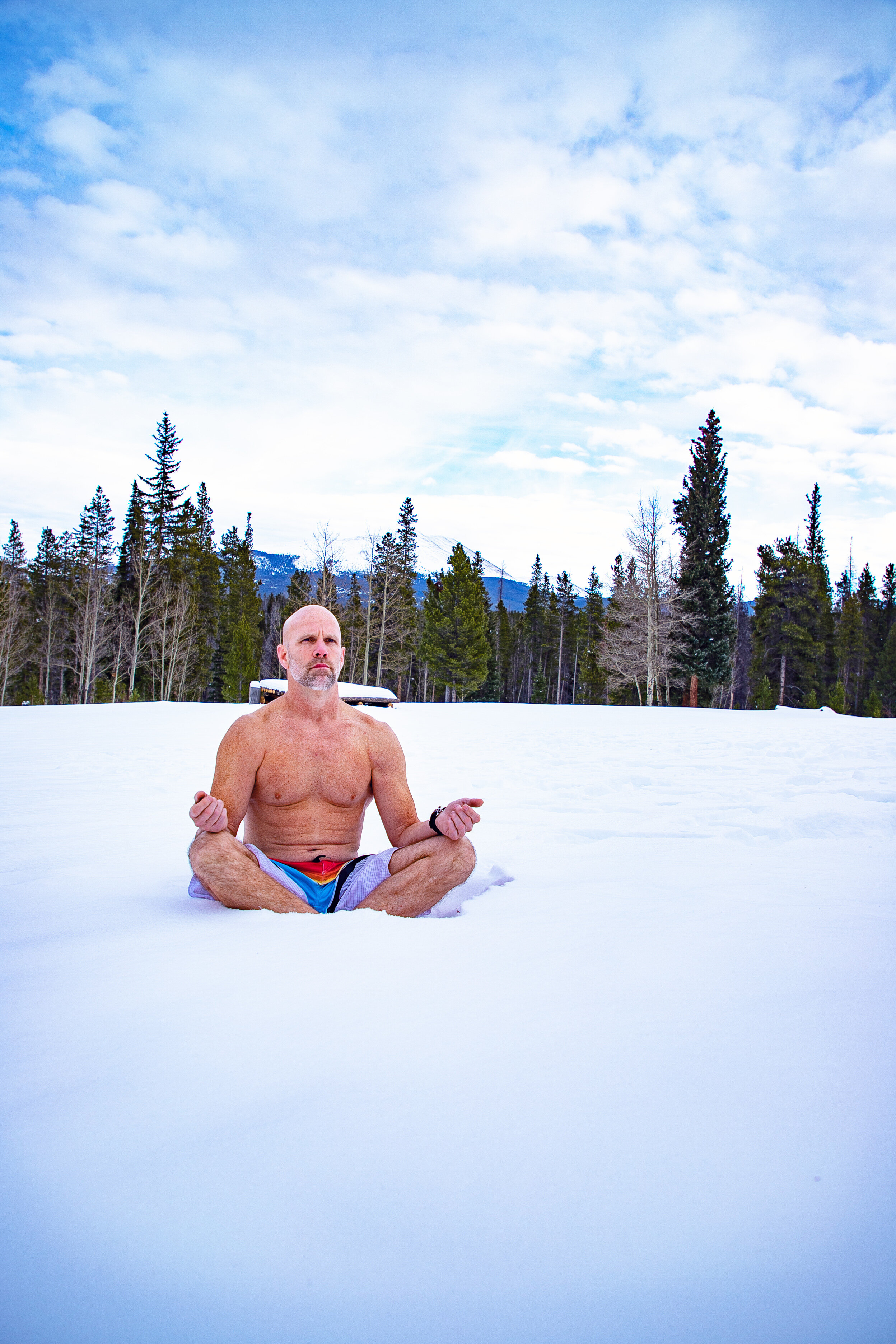The Iceman Knoweth: Cold Therapy, Breathing Techniques & Meditation are Better Than Pills
Certified Wim Hof Method Instructor Errol Doebler
Wim Hof, also known as The Iceman, has set the Guinness world records for farthest swim under ice, fastest half-marathon barefoot on ice and snow, and the longest time in direct full-body contact with ice. The Dutchman summited Mount Kilimanjaro in two days, climbed to 23,000 feet on Mount Everest wearing only shorts and shoes, and ran a full marathon in the Namib Desert without water.
Hof, 60, claims to have accomplished all of these feats by employing a regimen of cold therapy, breathing techniques, and meditation in order to control his body’s stress response and immune system: “That power is the same power we can learn to embrace and awaken in which we are able to tackle any stressor in the world – emotionally or physically, mentally – whatever you have, we are built to be able to get through and to learn and not to be afraid because we have the power of the mind.” I wonder if I can will myself a few inches taller?
In the 1920s, Walter Cannon coined the phrase “fight or flight” describing how perceived stress can influence reaction of the sympathetic nervous system. Perception in the mind controlled physical reactions in the body. During World War II, Henry Beecher ran out of morphine when treating his wounded soldiers and started administering a saline solution in place of the painkiller. Not telling the wounded of the saline, many of the soldiers reported a reduction or even an absence of previous pain, showing the power of the placebo. The soldiers believed they were receiving painkillers, so their mind relieved the pain.
For centuries, many cultures have believed in the power of the mind to influence their physical bodies. According to “A clinical guide to the treatment of human stress response” by George S. Everly and Jeffrey M. Lating in 2002, some of the earliest written records of meditation (Dhyana), come from the Hindu traditions of Vedantism around 1500 B.C. Benefits can include improved sleep, decreased blood pressure, and reduced anxiety.
A study in Psychoneuroendocrinology (Feb. 26, 2019) demonstrated that long-term meditation practitioners had faster cortisol recovery from stress as measured by changes in salivary cortisol, heart rate, and heart-rate variability.
In yoga, pranayama, also dating as far back as 1500 B.C., is the formal practice of controlling the breath. This practice is said to purify the blood and respiratory system while enriching the blood with oxygen. A study in the International Journal of Yoga showed an 8-week yoga intervention for healthy inactive middle-aged people improved the overall respiratory and physical functions, and the inclusion of pranayama had the added benefit of improving inspiratory muscle strength and global body flexibility.
Egyptians used cold therapy to treat injuries and inflammation as far back as 2500 B.C. The Edwin Smith Papyrus, the most ancient medical text known, dated 3500 B.C., made numerous references to the use of cold as therapy. In a collaboration with the Netherlands’ Radboud University in 2013, Hof and 30 other participants underwent a study to see how far his method could go in regulating immune response. Eighteen of the participants were trained in the Wim Hof Method by Hof himself. They practiced for six days before the experiment by taking cold showers, meditating, and utilizing breathing technique. On the day of the experiment, the trained group as well as a control group were injected with an E. coli bacteria. For the three hours of the experiment, the trained group practiced their breathing and meditation techniques. Blood values confirmed the trained group produced less inflammatory proteins and more anti-inflammatory proteins than the control group. The trained group also showed far fewer symptoms of influenza. The researchers concluded that this experiment confirmed a clear voluntary activation of the autonomic nervous system.
Who among us couldn’t benefit from more efficient stress response, less anxiety, lower blood pressure, higher flexibility, better immune response? These days, many people are quick to rely on pharmaceutical intervention to treat many of their issues. If breathing, meditating, and even taking a cold shower have all of the benefits discussed above, I think all of us should be using these methods to ensure a long, happy and healthy life. Who knows the limits of our mind-body connection? Keep meditating. I just grew three inches since the beginning of this article.

